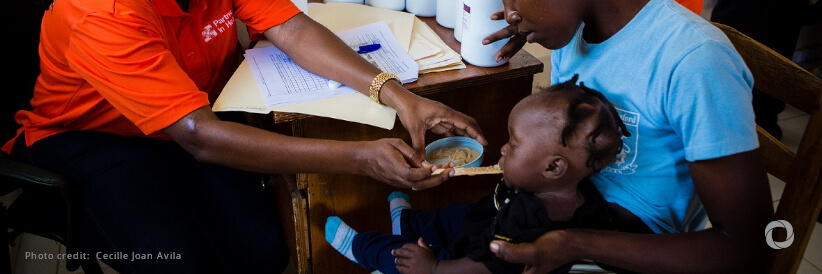Despite the ever-changing realities and the challenging circumstances on the ground, UNICEF remained committed to bolstering the response to malnutrition in the country, working hand in hand with the Ministry of Health and its partners.
In March alone, 16,201 children under five received appropriate care for wasting over 29,228 children who were screened for malnutrition across the country.
“In times of crisis, nutrition is more important than ever. Every second counts. Malnutrition is deadly. The time to act is now. Urgent actions are needed to prevent and treat malnutrition in children, provide communities with access to water and sanitation, and protect women and children from violence and exploitation,” says Roger Sodjinou, UNICEF Head of the Nutrition Programme in Haiti.
In the metropolitan area of Port-au-Prince, where a series of coordinated attacks perpetrated by armed groups have paralyzed the city, UNICEF and the nutrition cluster partners successfully managed to provide quality nutrition care to 5,299 children suffering from wasting.
UNICEF and its partners also took action not only to treat child wasting but also to prevent it. A total of 6,688 pregnant and breastfeeding women were reached with key messages on infant and young child feeding through social and behavioral change, along with micronutrient Additionally, 4,986 children aged 6-59 months received vitamin A supplementation at Internal Displaced Persons (IDP) sites in Port-au-Prince. Across the country, over 25,822 children aged 6 to 59 months received vitamin A supplements in March, and more than 7,195 caregivers received education and guidance on infant and young child feeding, as well as maternal nutrition in emergency contexts.
UNICEF worked closely with the Ministry of Health to maintain the provision of vital nutrition supplies, including ready-to-use therapeutic food (RUTF) and therapeutic milk products. However, ongoing violence continues to pose significant challenges to our partners in reaching the affected population in certain areas of Port-au-Prince, despite the availability of ample stock of therapeutic food. Across the country, UNICEF is also supporting health facilities and its partners with the provision of supplies that are critical for the treatment of common childhood illnesses and malnutrition prevention, including vitamin A supplements and deworming tablets.
UNICEF and partners forecast an alarming 19 percent increase in the number of children projected to suffer from severe acute malnutrition (SAM) in Haiti this year. Additionally, as evidenced by the latest IPC analysis, 1.6 million people are facing emergency levels of acute food insecurity (IPC Phase 4), which increases the risk of child wasting and malnutrition, especially in 8 areas of the country.
“UNICEF and WFP are collaborating closely to expand their reach and ensure a coordinated response to the current child malnutrition crisis, both in the metropolitan area of Port-au-Prince and throughout Haiti,” stated Dr. Sodjinou.

